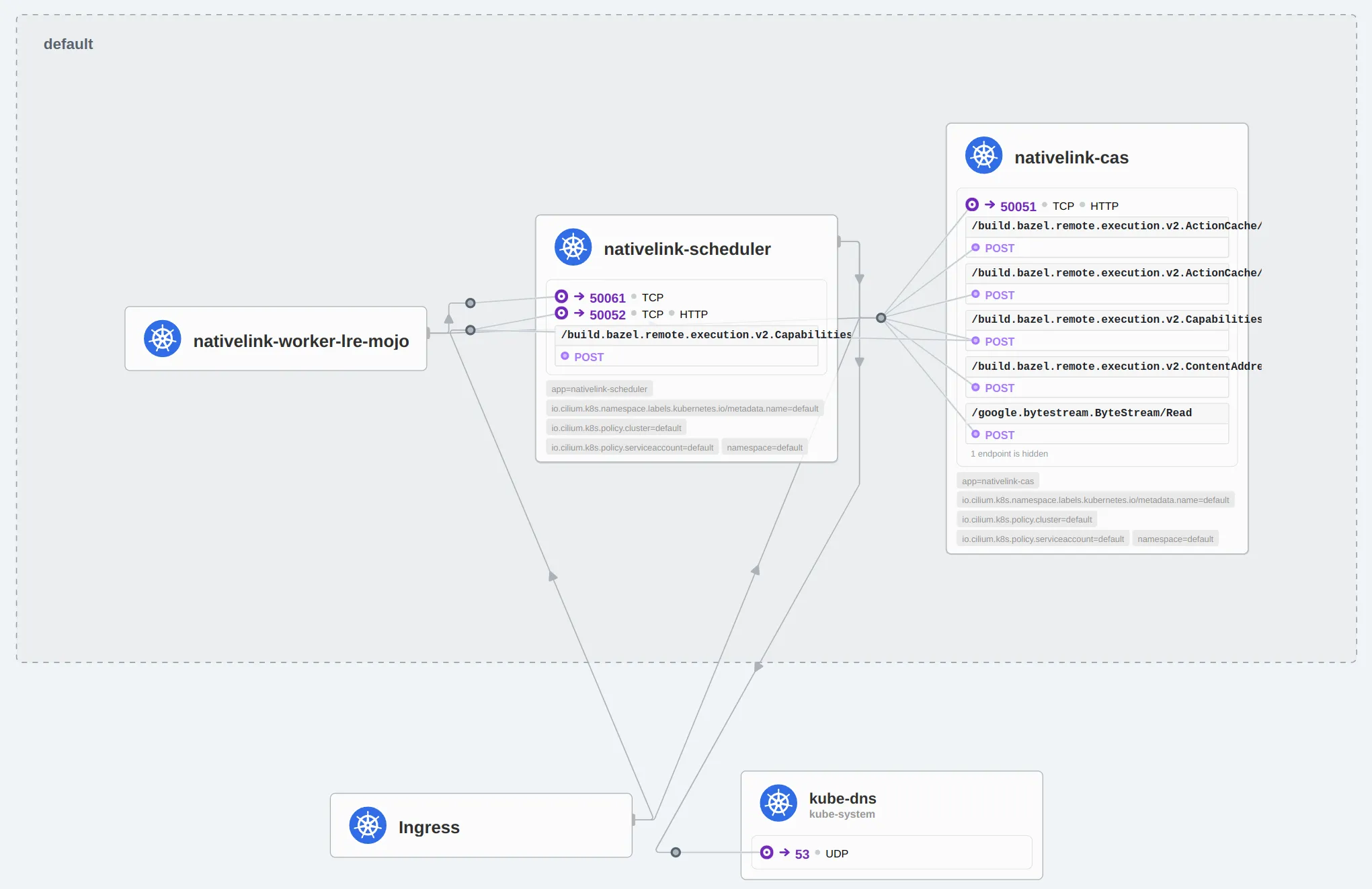Hermetic, reproducible Bazel/Nix rules for Mojo 🔥
Brings Mojo to all Linux distributions.
nix run github:TraceMachina/rules_mojo#mojo✨ Features:
- Mojo wrapped in Nix. No implicit
aptinstallations, no need to use Ubuntu. You can userules_mojoon anyx86_64-linuxsystem that has Nix installed. - Bazel rules for Mojo. This means that
rules_mojogives you incremental builds. Inrules_mojos own CI this reduces build times and CPU cycles spent by up to 95%. - Integration with NativeLink and Local Remote Execution (LRE) which lets you execute builds in arbitrarily scalable Kubernetes clusters. Whether you want to build on 1000 cores or run executables on edge networks across the world, the NativeLink+LRE infrastructure supports it.
- A bundled Clang/LLVM C++ toolchain with the mold linker and uutils, the Rust rewrite of coreutils. This toolchain links Mojo executables up to two orders of magnitude faster than a standard C++ toolchain.
- Pretty compiler crash stack traces, powered by the
llvm-symbolizerbuilt from upstream LLVM sources.
🔮 Coming soon™:
- Mac support.
- GPU support.
- Python interoperability.
🔪 Rough edges:
- Mojo is experimental and
rules_mojois even more experimental. Several features, such as linting and Python interoperability aren't yet implemented. Also, the LRE framework is still actively under development (in fact,rules_mojoacts as a validation case for LRE), so expect larger scale refactors. - At the moment there is no way to choose the Mojo version.
rules_mojouses a pinnednightlytoolchain that happened to not crash because stable crashed. - The toolchain links all executables to dynamic libraries from
nixpkgs. This brings potential performance improvements from recentglibcandlibstdc++versions, but makes the executables incompatible with systems that don't have these libraries present. You can attempt to rewrite theRPATHs with patchelf, but you might run intoglibcversion incompatibility issues on non-bleeding-edge systems. - The dynamic loader
ld-linux-x86_64.so.2isn't set to the Nix variant. This lets you runrules_mojo-built executables outside of the nix environment. However, on older systems the version mismatch between the dynamic loader and the nix-basedglibcmight lead to issues. When in doubt, useldd <path/to/executable>to double-check the dynamic dependency resolution.
🦋 Known bugs:
- While you can build tests remotely, you need to run them locally.
- All mojo invocations print
crashdbwarnings because it's unclear how to configure thecrashdboutput location to point outside of the nix store.
Install Nix and enable flake support. The new experimental nix installer does this for you: https://github.com/NixOS/experimental-nix-installer
Install direnv and add the direnv hook to your
.bashrc:
nix profile install nixpkgs#direnv
# For hooks into shells other than bash see https://direnv.net/docs/hook.html.
echo 'eval "$(direnv hook bash)"' >> ~/.bashrc
source ~/.bashrcNow clone rules_mojo, cd into it and run direnv allow:
git clone git@github.com/TraceMachina/rules_mojo
cd rules_mojo
direnv allowNote
If you don't want to use direnv you can use nix develop manually which is
the command that direnv would automatically call for you.
Inside the Nix environment you'll have access to the mojo command:
# The mojo REPL.
mojo
# Build a mojo executable.
mojo build examples/hello.mojo
# Build a mojo package.
mojo package examples/mypackage
# Invoke the nix-packaged `mojo` executable
# outside of the `rules_mojo` repository:
nix run github:TraceMachina/rules_mojo#mojoTo test the mojo_toolchain with Bazel, run the Mojo standard library test
suite:
bazel test @mojo//...Tip
Check out thirdparty/mojo.BUILD.bazel for
the build file of this target.
To run the example in the examples directory:
bazel run examples:helloYou can test the remote execution capabilities of rules_mojo by spinning up
the builtin Kubernetes cluster with a pre-configured NativeLink setup.
Make sure you have a recent version of Docker installed. Then you can invoke the following command from within the Nix flake:
lre-mojo-clusterThis spins up a local kind cluster, builds a Mojo remote execution container and deploys it into a NativeLink remote execution setup.
The setup may take a minute to boot up. When running the command the first time it might take some time to build NativeLink from source inside the cluster pipelines.
Visit http://localhost:8080/?namespace=default to view the cluster topology.
To now point Bazel invocations to this cluster, invoke lre-bazel instead of
bazel:
lre-bazel test @mojo//...
lre-bazel run examples:helloThis sends build invocations to the cluster instead of building locally on your own machine.
Note
At the moment you can build all artifacts remotely, but tests have to run
locally. Future versions of rules_mojo intend to address this issue.
To delete the cluster, run:
lre-kill-the-mojoWarning
This section is still under construction.
See the templates/default directory for templates. To start an entirely new
project:
mkdir myproject
cd myproject
git init
nix flake init -t github:TraceMachina/rules_mojoLicensed under the Apache 2.0 License with LLVM exceptions.
This repository wraps the Modular Mojo SDK which is under a proprietary license,
bundled with the SDK and also available in the licenses directory.
